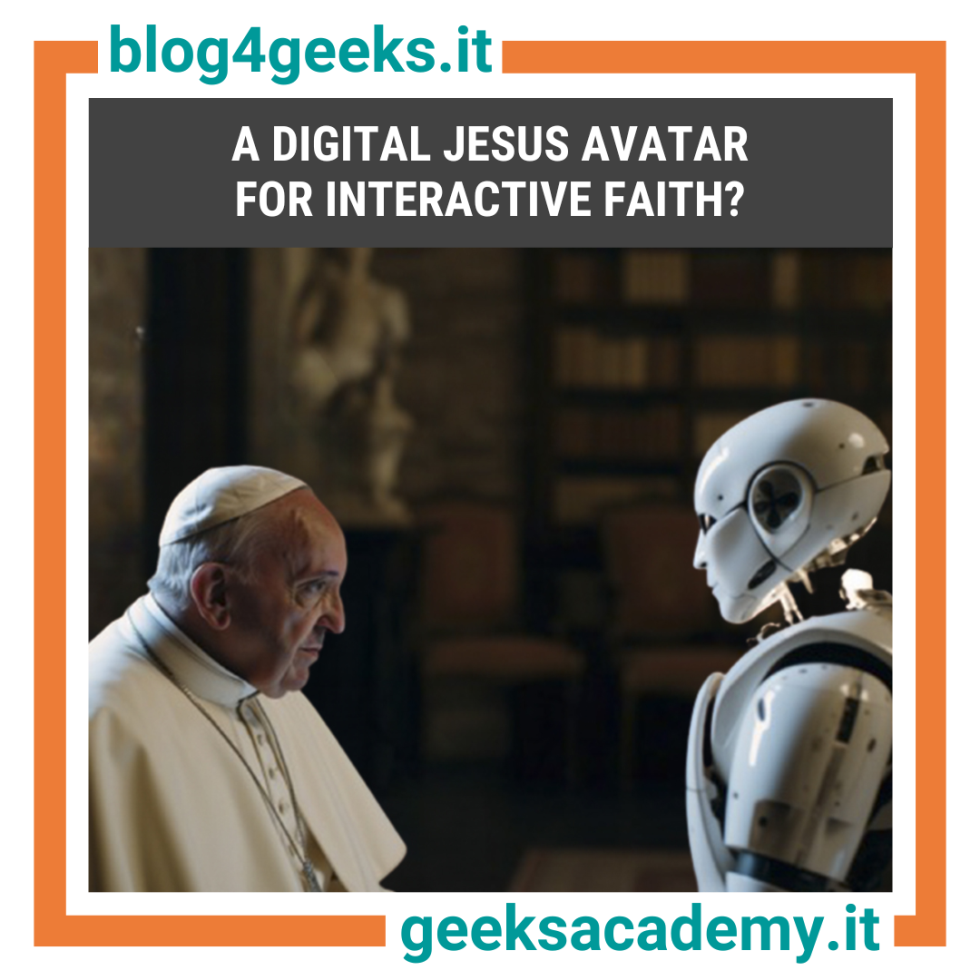
Discover Geeks Academy’s articles on: Blockchain, Coding, Cybersecurity, Cloud, Big Data, Artificial Intelligence, Gaming, Digital Innovation
Introduction
Artificial Intelligence (AI) is permeating every aspect of modern society - from medicine to finance, and now, even spirituality. This technology, capable of answering complex questions and offering emotional comfort, is beginning to enter sacred spaces. Recently, installations like Deus in Machina in Lucerne and other similar projects have sparked debates on the relationship between faith and technology. But how can these two seemingly opposite dimensions be reconciled?
A
Digital Jesus Avatar for Interactive Faith?
The Church of Saint Peter in Lucerne hosted a pioneering project: a digital avatar of Jesus capable of conversing with worshippers in over 100 languages. Described by many as a mystical experience, the installation was conceived as an artistic intervention within a confessional booth. Thousands of people interacted with the AI to seek answers and spiritual comfort.
Theologian Don Marco Schmid, involved in the project, explained that the goal was to offer an interactive spiritual experience, not to replace traditional religious practices.
Other Projects and Ethical Concerns
At the same time, other initiatives - such as the Padre Pio chatbot developed by an Italian startup - have demonstrated how AI can be used to answer questions rooted in religious teachings and provide emotional support. However, these innovations raise significant ethical concerns, particularly regarding privacy. Interactions with AI systems that collect sensitive data must be handled responsibly and transparently to prevent misuse or breaches.
Robotic Priests: Reality or Science Fiction?
In a context of declining religious vocations, the idea of robotic priests capable of performing pastoral functions may sound like science fiction—but it’s not entirely out of reach. Envisioning a humanoid robot hearing confessions or offering spiritual comfort raises important questions about authenticity and acceptance.
Some see such tools as an opportunity to bridge gaps in underserved communities. Others worry they may undermine the sacred nature of the priest’s role.
It’s important to note that these technologies, if introduced, would be designed as support tools - not as replacements for human clergy. Any implementation of robotic priests would need to be regulated and supervised by the Church, to ensure alignment with core religious values and traditions. Ultimately, these technologies cannot replicate the empathy and deep understanding that characterize true spiritual dialogue.
A parallel can be drawn with the use of AI bots in psychology, where digital tools offer initial support to individuals in distress. These bots do not replace human therapists but serve as entry points - helping users overcome shame or barriers to access. The same logic could apply to robot priests: facilitating access to sacraments or serving as an initial point of contact in emergencies or isolation.
The Catholic Church and the Ethics of AI
The Catholic Church is approaching AI with pragmatism. Pope Francis, through the Pontifical Academy for Life, promoted the AI Ethics for Peace initiative - aimed at creating ethical guidelines for AI and safeguarding human dignity.
On July 10, 2024, a multifaith summit in Japan brought together leaders of various religions to discuss the ethical use of AI. The event, co-organized by the Pontifical Academy for Life, Religions for Peace Japan, the Abu Dhabi Forum for Peace, and the Interreligious Commission of the Chief Rabbinate of Israel, concluded with 16 religious leaders signing the Rome Call for AI Ethics.
This summit showed how technology can become a bridge between spirituality and innovation - and a platform for dialogue on moral and philosophical issues.
Conclusion
The integration of artificial intelligence into religious life presents both a challenge and an opportunity. On one hand, it introduces new tools for communication and spiritual support. On the other, it raises ethical and privacy concerns that cannot be overlooked.
The Church, supported by leaders like Pope Francis, is working to define ethical guidelines for the responsible use of these technologies. A constructive dialogue between theologians, technologists, and the faithful will be crucial to ensure that AI is used in a way that honors the fundamental values of faith.
How this synergy will evolve remains to be seen. But one thing is certain: modern spirituality is undergoing an unprecedented transformation.
This article is adapted from episode #4 of the weekly series L’hAI Sentito? – Tech News Bites, hosted by Antonio Venece, Director of Geeks Academy, and broadcast every Wednesday on Channel 14 of Italian terrestrial TV.